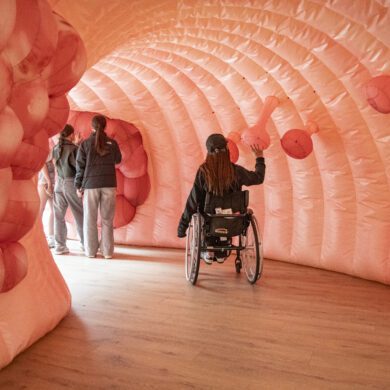Overview
Dumping syndrome is a broad term. It describes the effects of food and drink being rapidly “dumped” into the small bowel.
Normally, the stomach holds food and drink for a while after a meal. While in the stomach, digestion can begin. Acid and enzymes break down solids and liquids to release their nutrients. This prepares them for absorption in other parts of the bowel. The stomach releases its contents into the small bowel at a slow, steady rate. This prevents overloading the gut with too many nutrients at once.
But in people living with dumping syndrome, the normal orderly function of the stomach is disrupted. Dumping syndrome has two distinct phases:
Early dumping
This usually occurs 10 to 30 minutes after eating and drinking. When food and drink quickly enter the small bowel, it acts like a sponge. Food and drink draws fluid from the rest of the body into the bowel. This causes the bowel to swell. Early dumping symptoms are due to changes in fluid levels in the bowel. High-sugar foods and drinks are particularly bad. They draw more fluid into the bowel. Some people may also experience symptoms with foods high in fat and hot drinks.
Late dumping
This occurs later, typically 1 to 3 hours after eating and drinking. It reflects sugar absorption from the intestine and a rapid rise in blood glucose. To control blood sugar, the body releases a lot of insulin from the pancreas. Insulin is a hormone the body produces to reduce blood sugar. High insulin levels cause a rapid drop in blood glucose. It can fall below normal levels. Other gut hormones can also be abnormally regulated adding to the problem. This is particularly true after surgery that cuts the vagal nerve, for example oesophagectomy and vagotomy (see causes below). Low blood glucose causes the symptoms of late dumping. Again, foods and drinks high in sugar are especially bad. They cause bigger changes in blood sugar and insulin levels.
Causes
Dumping syndrome occurs in people with either abnormal stomach size or function. Common causes of dumping syndrome include:
- Surgery that bypasses or changes the shape of the stomach to help weight loss. This is called bariatric surgery. Dumping syndrome happens in 4 in 10 people who have had a sleeve gastrectomy or Roux-en-Y gastric bypass. This is a very common side effect. It can take 3 months to a year for late dumping syndrome symptoms to start after weight loss surgery.
- Surgical removal of all or part of the stomach for stomach cancer or other diseases like stomach ulcers. This is called a total or partial gastrectomy. The rate of dumping syndrome after gastrectomy is similar to bariatric surgery.
- After surgery to remove part of the oesophagus or gullet. This is called an oesophagectomy. Dumping syndrome happens in 1 in 2 people after an oesophagectomy. This is a very common side effect.
- Dumping syndrome can also happen for 1 in 5 people who have had a vagotomy with pyloroplasty. This surgery is rarely performed any more.
- Surgery for a hiatus hernia. This is called a Nissen fundoplication. In this case dumping syndrome is rare and it mostly happens in children. Rare means less than 1 in 1,000 up to 1 in 10,000 children who have the surgery.
- Rarely, dumping syndrome can, occur in people with non-surgical, fast stomach emptying. These are sometimes called functional stomach disorders.
Symptoms
As mentioned, dumping syndrome be divided into “early” or “late” dumping. People often have both types of symptoms.
Symptoms of early dumping include:
- Feeling sick
- Being sick
- Palpitations
- Sweating
- Bloating
- Belly cramping/pain
- Diarrhoea
- Noisy digestion
- Dizziness
- Fatigue – feeling tired and especially a desire to sit or lie down
- Occasionally fainting
Symptoms of late dumping syndrome include:
- A hypoglycemia (low blood sugar) level less than 2.8mmol/l
- Weakness
- Confusion
- Hunger
- Sweating
- Dizziness
- Fainting
- Palpitations and tremor
Diagnosis
Doctors usually diagnose dumping syndrome by its characteristic symptoms. It mostly occurs in people who have had digestive tract surgery. Specialist tests may be needed to rule out other conditions with similar symptoms. These tests may include:
- Blood tests
- Endoscopy
- Ultrasound (to rule out gallstones)
- Hydrogen breath test (to rule out bacterial overgrowth of the small intestine)
- Barium swallow and meal
- Gastric emptying study
Both a barium swallow and meal and a gastric emptying study can test stomach function and its emptying speed. A gastric emptying study usually involves eating a standard meal. It contains a radioactive tracer that can be imaged as it passes through the stomach. This is the most accurate way to assess stomach emptying. But it is rarely used to diagnose dumping syndrome.
Late dumping can be confirmed with a glucose tolerance test. This requires an overnight fast1 and drinking a standard glucose drink. Then, testing the blood sugar levels over time. It is important to be closely supervised by a healthcare professional during testing due to risk of severe low blood sugar (hypoglycaemia). Tests also might include heart rate and blood pressure monitoring.
Treatment
The main treatment involves dietary changes. As most people have relatively mild symptoms they respond well to this approach. In people with low blood pressure after meals, lying down for 30 minutes may help. Low blood pressure feels like being light-headed. You might also sweat, feel dizzy, confused, faint and have blurred vision plus feel sick. Medicines might help if diet changes haven’t worked or if symptoms are bad. Medicines help to slow the stomach emptying and movement of food into the intestine. It might be useful to complete a food and symptom diary to find out which foods are problematic as symptoms can vary. This will also be useful to share with your healthcare professional.
Diet
Advice is usually given by a dietitian. It includes several measures to reduce the effects of dumping, such as:
- Eating smaller meals, more often. To get the nutrients you need, this should be at least five or six times a day.
- Eating slowly and chew your food well. This helps prepare food for digestion. You may also find ground meat such as mince easier than steak or chops.
- Drinking liquids at least 30 minutes after eating a meal instead of with meals.
Advice also includes avoiding sugary foods and drinks. Examples include:
- Sugary drinks such as cola and fruit juices.
- Coffee and tea with added sugar.
- Alcoholic drinks (with mixers that contain a lot of sugar).
- Sugary breakfast cereals.
- Sugar of all types including table sugar, honey, syrups and fructose-based sugars.
- Sweet biscuits.
- Ice cream.
If you have symptoms of dumping syndrome from a weight-maintaining supplement drinks, speak to your dietitian. Or, ask your doctor to refer you to one. They could advise a better option for you. Examples of common supplement drinks include Ensure, Fortisip, Actagain, Fresubin.
Eat more complex carbohydrates instead of white bread or white pasta for example. These include wholegrains, for example:
- Wholewheat pasta
- Potatoes with skins
- Wholegrain rice
- Wholemeal breads
- Unsweetened cereals
Eat more foods high in soluble fibre. This slows the stomach’s emptying and stops fast intake of sugars into the body. The following foods are examples of food high in soluble fibre:
- Broccoli
- Brussel sprouts
- Nuts, linseeds and chia seeds.
- Oats
- Beans and pulses such as chickpeas, soya beans, lentils and peas.
- Fruit and vegetables such as carrot, kiwi, okra, pears, prunes.
- Eat a protein-containing food with each meal. High-protein foods include:
- Eggs
- Meat, poultry and fish
- Milk, yoghurt and cheese
- Beans
- Nuts
Some healthcare practitioners suggest lying down after a meal. But there’s not much research to back this advice. The advice is given to prevent falls. Doctors recommend it based on their experience and the benefits they’ve seen. If you have had oesophagectomy surgery, lying down will increase reflux symptoms. Many people use a wedge pillow to avoid this situation.
Ketogenic diets are not advised for people with dumping syndrome due to risks of low blood glucose. Ketogenic diets are diets where starchy carbohydrates are excluded.
Medicines
Acarbose delays carbohydrate absorption. It has been shown to help people with late dumping symptoms. However, some research found it hard to distinguish between early and late dumping. Guidelines suggest it cannot be fully excluded for early dumping syndrome. Acarbose can cause side effects of bloating and wind in more than 1 in 10 people taking it. It can cause diarrhoea for between 1 in 100 to 1 in 10 people taking it.
Octreotide is a man-made version of the hormone somatostatin. It delays stomach emptying. It also reduces the release of insulin and several gut hormones. Octreotide is given as an injection. It is rarely used to treat dumping syndrome.
Some new medicines are starting to be used to slow stomach emptying. Many of these are also used to treat people with diabetes. However, we do not have enough evidence to recommend anything yet.
Support
Once the condition has been diagnosed, a referral to a dietitian should be made. They will explain the needed dietary changes and tailor them to you. They may suggest you keep a food and symptom diary. This is to check if any diet changes are helping. It is important to monitor weight after making the needed diet changes. This is to ensure that enough calories are being eaten. If you lose a lot of weight, tell the dietitian or doctor. If symptoms don’t improve after dietary changes, ask to see your doctor again. Then, medication can be considered.
How can dumping syndrome affect you over time?
Dumping syndrome symptoms can be very hard to bear and upsetting. In those with severe symptoms, this can lower their quality of life. It may also cause poor nutrition from avoiding food and drink.
If the symptoms harm your mental health, tell your doctor or dietitian. They can provide proper treatment. For some, post-operative dumping improves with time.
What to ask your doctor about your dumping syndrome?
- Do I need any tests to confirm the diagnosis of dumping syndrome?
- May I see a dietitian to discuss what type of food I should be eating/avoiding?
- If dietary modification does not help my symptoms, which medicine would you recommend?
Research
Researchers are looking into new medicines for dumping syndrome. Medicines include the new weight loss drugs, GLP-1 receptor antagonists: Lyraglutide and Beinaglutide. But more trials need to be done before they can be used widely.
Discover more:
Copyright © 2026 Guts UK. This leaflet was published by Guts UK in August 2025 and will be reviewed in August 2028. The leaflet was written by Guts UK and reviewed by experts in dumping syndrome and has been subject to both lay and professional review. All content in this leaflet is for information only. The information in this leaflet is not a substitute for professional medical care by a qualified doctor or other healthcare professional. We currently use AI translation tools on our website, which may not always provide perfect translations. Please check for further explanation with your doctor if the information is unclear. ALWAYS check with your doctor if you have any concerns about your health, medical condition or treatment. The publishers are not responsible or liable, directly or indirectly, for any form of damages whatsoever resulting from the use (or misuse) of information contained or implied in this leaflet. Please contact Guts UK if you believe any information in this leaflet is in error.



